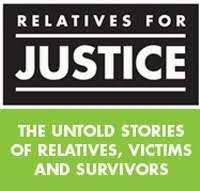Relatives for Justice
 | |
The Relatives for Justice (RFJ) are a support group formed in the mid-1990s in Dungannon, Northern Ireland. RFJ have offices on the Glen Road in west Belfast and in Dungannnon, County Tyrone and operate satellite sessions from community centres across Northern Ireland.
Mission
- Building and providing access to safe, integrated and professional services and programmes of support for the bereaved and injured of the conflict
- Contributing to the health and wellbeing of victims and survivors
- Realising empowerment through building skills, confidence and self-awareness
- Encouraging the bereaved and injured to realise their role in peace building and processes designed to deal with the past
- Investing in Relatives for Justice through training and sustainable partnerships
Aims
- To provide a safe space for the bereaved and injured of the conflict
- To provide professional, appropriate and development based individual, family and group support for the bereaved and injured in an holistic, integrated fashion
- To develop and deliver said support in partnership with other professional organisations where appropriate
- To support the bereaved and injured to tell their story and document their experiences
- To build awareness and foster an understanding of the specific experiences and needs of the bereaved and injured of the conflict in a transitional context
- To contribute to the search for truth, highlight injustice and contribute to a culture of human rights
- To support families engaging with relevant processes to deal with the past including legal processes
- To liaise with domestic and international human rights NGOs, government bodies and other international organisations in the furtherance of the realisation of the rights of victims and survivors of the conflict
Core values
- An active commitment to universal human rights and social justice
- The promotion of equality and respect for the background, diversity and experience of all those bereaved and injured by the conflict
- The application and development of the highest standards of professional support programmes for victims and survivors of the conflict
- The promotion of recognition and remedy for the specific gender harms and experiences of the bereaved and injured of the conflict[1]
Who armed the Loyalists?
"Loyalists were re-armed in late 1987 when MI5’s Force Research Unit (FRU) dispatched their agent Brian Nelson with the proceeds of a Northern Bank robbery in Portadown to South Africa to purchase a shipment of weapons that had initially been destined for the PLO. The ship being previously intercepted by the South African apartheid regime at the request of the Israeli government.
"It was subsequently reported in London’s Private Eye that Nelson’s role in traveling to South Africa and purchasing the weapons for loyalists had been approved by a member of the British Cabinet at the time.
"As a direct consequence of the importation of these weapons loyalists embarked on an unprecedented period of sectarian and political assassinations in which numerous others aspects of official collusion, apart from providing weapons, is well evidenced and documented. Loyalists are responsible for more deaths from this period onwards than any other participant to the conflict.
"Whilst the decommissioning of the loyalist arsenal by the UVF, and the intentions of the UDA/UFF to do likewise, is a step in the right direction it nevertheless raises the question of arming the loyalists.
"Over 300 people, Protestant and Catholic alike, have died as a direct result of the importation of these weapons by MI5. Culpability for these deaths must rest with the British government. When the role of Nelson and MI5 was first exposed the British MoD and the the British government attempted to tell the public that they were monitoring the ship enroute to Larne Harbour from Pretoria in South Africa yet somehow managed to ‘lose track’ of it allowing the majority of weapons to get through to loyalists. This story had numerous holes in it when examined by investigative journalists and in taking into account other necessary resources also provided to loyalists that enabled them to effectively target people. An acquired ability that was hitherto dormant.
"When Relatives for Justice documented the awful catalogue of human carnage and death as a consequence of the use of the weapons, mostly AK 47 Automatic Assault Rifles and 9MM Browning Pistols, the RUC abandoned its policy of making public the forensic and ballistic reports on attacks and killings by loyalists as each incident was linked to the shipment. They continued the policy of making public this same information concerning incidents involving republicans.
"Families affected by loyalist violence want the truth about arming the loyalists and the killings of their loved ones. Families, and indeed the wider public, want a commitment by the British government that they will never again arm loyalism.
"Emphasis now needs to be on truth and dealing with the legacy of the conflict in an independent way that addresses the arming of the loyalists by the British government’s intelligence services as part of its overall policy objective that was collusion."[2]
References
Wikipedia is not affiliated with Wikispooks. Original page source here